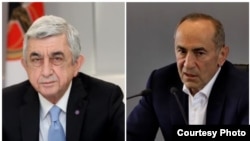The idea has reignited a war of words between Hayastan and the Pativ Unem bloc that began early this year. It was officially floated late last month by two well-known critics of the Armenian government. Their We Are Awake initiative group has since been lobbying opposition lawmakers to attempt a no-confidence vote in Pashinian.
Under Armenian law, a motion of no confidence must be backed by least 36 members of the 107-seat parliament. Hayastan and Pativ Unem, which is dominated by former President Serzh Sarkisian’s Republican Party (HHK), control 28 and 6 parliament seats respectively, lacking the votes to even force a parliament debate on the issue.
Hayastan pointed to this fact in a statement issued late last week. It said it will join the initiative if We Are Awake secures the signatures of 8 other parliament deputies and manages to hold massive demonstrations in support of Pashinian’s removal from power.
By contrast, Pativ Unem on Tuesday officially voiced support for the proposed motion of censure. It also expressed readiness to endorse Kocharian’s candidacy for the post of prime minister.
Hayastan did not immediately react to the offer. Its senior members suspect that the long-shot initiative is a ploy designed to discredit Kocharian and score points at his expense before the next general elections due in June 2026.
Agnesa Khamoyan, a Hayastan lawmaker, said on Tuesday that the two activists leading We Are Awake are “directly or indirectly linked” to Sarkisian. “And they don’t deny that,” she told RFE/RL’s Armenian Service.
“A large part of those people waging that dirty smear campaign against Serzh Sarkisian for the last seven years present themselves as supporters of Robert Kocharian,” shot back Pativ Unem’s Hayk Mamijanian.
Supporters of the two ex-presidents and erstwhile allies have traded bitter recriminations over the last few months. In particular, they have accused each other of helping Pashinian come to power in 2018.
Sarkisian said late last month that his party has devised a new plan to oust Pashinian but refused to shed light on it. He hinted only that he favors trying to achieve regime change through street protests before the next elections. By contrast, Kocharian seems to regard the polls as the best way to achieve that goal.




